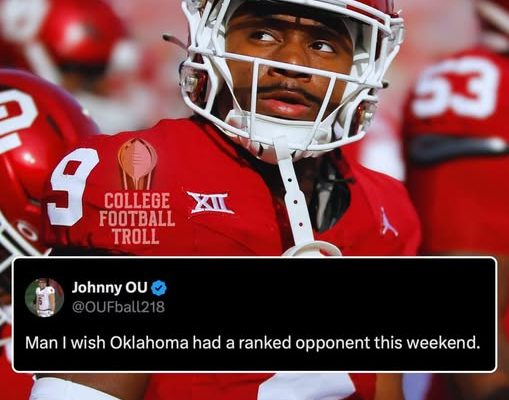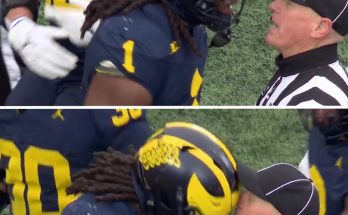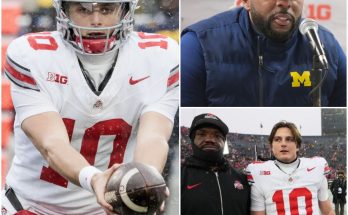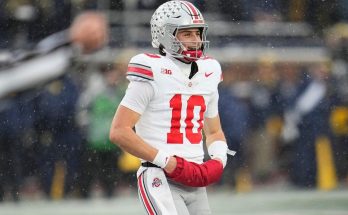Oklahoma needs a ranked opponent already! That’s not just a plea from impatient fans—it’s a statement of truth echoing through the college football landscape. For a program with the pedigree, expectation, and relentless competitive spirit of the Oklahoma Sooners, cruising through unranked opponents feels more like an extended scrimmage than a true test of championship mettle. Every week, the Sooners show flashes of dominance, efficiency, and control, yet the burning question remains: how good are they, really? Until they face a ranked team, that answer remains wrapped in speculation.
The Sooners’ start to the season has been clean—perhaps too clean. They’ve dismantled weaker opponents with ease, piling up points and padding defensive stats, but without a legitimate ranked adversary, their true ceiling is still unknown. This isn’t about disrespecting the teams they’ve faced. Every opponent steps onto the field with pride and purpose, but Oklahoma’s talent, speed, and depth are simply on a different level. What the Sooners need now is friction—resistance that tests their composure, adaptability, and leadership when the game tightens and the margin for error disappears.
For head coach Brent Venables, that challenge can’t come soon enough. After two seasons of rebuilding and recalibrating the defensive culture, Venables’ team finally looks like a well-rounded force. The defense that once leaked yards and points has found its identity: aggressive, disciplined, and confident. The offense, under the steady hand of quarterback Jackson Arnold, has evolved into a balanced attack capable of burning defenses through the air or pounding them on the ground. The pieces are there—but they’ve yet to be tested in the kind of high-stakes, top-25 clash that reveals whether a contender is forged or merely polished.
College football is defined by moments of pressure—fourth quarters when the crowd roars, the playbook tightens, and execution separates pretenders from champions. Oklahoma hasn’t had that yet this season. Every game so far has tilted heavily in their favor by halftime, leaving starters on the sideline for much of the second half. While that’s great for rest and injury prevention, it doesn’t simulate the mental grind of closing out ranked opponents or responding to adversity. The best teams welcome that discomfort, knowing it’s the only way to harden themselves for conference championships and playoff runs.
There’s a psychological component to this, too. Players, no matter how disciplined, feel the difference when the lights shine brightest. Facing a ranked opponent isn’t just about the opponent’s skill—it’s about the atmosphere, the stakes, and the urgency that comes with knowing one mistake can swing the outcome. That’s when leadership matters most. Can Arnold keep his poise when blitzed on third-and-long? Can the defense communicate under pressure? Can the offensive line hold steady when the opponent has future NFL pass rushers breathing down their necks? Those answers can’t come from blowouts—they’re only revealed in battles that bruise your pride before earning your respect.
Fans, too, are feeling the tension. Sooner Nation has always thrived on drama—the Red River Rivalry, the Bedlam clashes, the epic playoff runs. But this early stretch of unranked opponents feels like waiting for the movie’s plot to start. Everyone knows Oklahoma has the talent to dominate, but dominance only means something when it’s measured against other elite programs. In today’s college football environment, perception matters. Polls, playoff committees, and national media narratives feed on strength of schedule. A flawless record against unranked teams doesn’t always impress voters who value big-stage wins.
That’s why Oklahoma’s upcoming schedule looms large. The Sooners can’t control who’s ranked when they play them, but they can control how they perform and how convincingly they separate themselves from the rest of the Big 12—or soon, the SEC. With Texas looming as their next likely ranked showdown, the anticipation builds. Every Sooners fan remembers last year’s Red River shootout, a clash that reignited Oklahoma’s pride and restored its national relevance. This year, that matchup could define their playoff hopes. A win there would silence the “unproven” label and announce—loudly—that Oklahoma isn’t just back; they’re better.
There’s a bigger picture here, too. College football’s landscape is shifting faster than ever. Conference realignments, NIL dynamics, and the expanded playoff format mean that the margin for national respect is razor-thin. Programs like Oklahoma, with rich histories, can’t afford perception gaps. Beating ranked opponents is no longer just a résumé booster—it’s a necessity for maintaining relevance among the sport’s giants. Alabama, Georgia, Ohio State, Michigan—each has proven itself under pressure. Oklahoma, for all its tradition, must reassert itself in that same tier.
The Sooners’ offensive statistics are staggering. Their scoring average hovers near the top nationally. Their efficiency on third downs, their red zone conversions, their passing rhythm—all pristine. But those numbers, as analysts love to point out, can deceive when opponents aren’t elite. When facing lesser defenses, the windows are wider, the timing cleaner, the margin of error forgiving. Against ranked foes, those margins vanish. That’s when execution—not just talent—defines the outcome.
Jackson Arnold, to his credit, has shown maturity beyond his years. He doesn’t force throws, doesn’t panic under pressure, and seems to thrive in the rhythm of the offense. But even the best young quarterbacks need signature wins to validate their rise. Every great Oklahoma QB—Baker Mayfield, Kyler Murray, Jalen Hurts—had that defining ranked showdown where they stared down the moment and owned it. Arnold’s time for that will come soon, but the wait feels too long. Fans are eager to see if he has that same clutch DNA that turns good quarterbacks into legends.
Defensively, Venables has built something that finally resembles the powerhouse identity he brought from Clemson. The Sooners swarm, tackle with authority, and communicate better than they have in years. Yet again, the question is: how does that defense hold when facing elite playmakers who won’t be intimidated? It’s one thing to shut down unranked teams—it’s another to face a top-10 offense and still impose your will. The defense believes it’s ready. The fans believe it’s ready. But belief only carries weight when it’s tested in the fire.
Every dominant program goes through this phase—the calm before the storm. The Sooners are in that space now: confident, undefeated, but unchallenged. It’s like tuning a race car on an empty track. You know it’s fast, but you won’t know how it truly performs until you line it up against another champion. The waiting becomes its own kind of pressure. Every easy win invites skepticism, and every missed test feels like a delay in proving legitimacy.
For Oklahoma, this season is about more than just winning—it’s about validation. The Sooners are preparing to enter a new era in the SEC, where ranked opponents won’t just appear occasionally; they’ll dominate the calendar. Facing ranked competition will become the norm, not the exception. That makes this current waiting period feel like an itch that needs scratching. The team and fanbase are hungry for that measuring stick, that chance to look across the field and see equal talent staring back.
Until then, the Sooners can only control what they can: discipline, preparation, and focus. Great teams don’t get bored of success—they refine it. Every rep, every drive, every defensive stand matters, because habits built now will decide outcomes later. When that ranked opponent finally lines up across from them, Oklahoma won’t need to flip a switch—they’ll already be glowing with confidence forged from consistency.
Still, college football thrives on emotion, and emotion thrives on rivalry and stakes. The Sooners need that emotional spark. The players crave it. The fans demand it. The sport itself feels emptier without it. Oklahoma football isn’t built to glide quietly through schedules—it’s built for drama, challenge, and glory. And that can only happen when the opponent’s name carries weight, when the stakes are high, and when the spotlight burns hot.
So yes, Oklahoma needs a ranked opponent already. Not just for the sake of rankings or headlines, but for the soul of competition. The Sooners have shown they can dominate; now they must show they can endure. The waiting has stretched long enough. The team looks ready. The fans are restless. The stage awaits.
When that ranked opponent finally arrives—whether it’s Texas, a late-season SEC powerhouse, or a playoff-bound contender—the college football world will tune in. And if Oklahoma delivers under that pressure, the conversation will shift from “when will they be tested?” to “who can stop them now?”
Until then, every blowout feels like a drumbeat building toward that inevitable showdown. The Sooners’ destiny won’t be decided by how many unranked teams they conquer, but by how they perform when everything is on the line. That’s the standard at Oklahoma. That’s the expectation. That’s what makes this waiting feel so heavy.
The Sooners are too good to be unchallenged for long. The storm is coming—and Oklahoma looks ready to meet it head-on.



